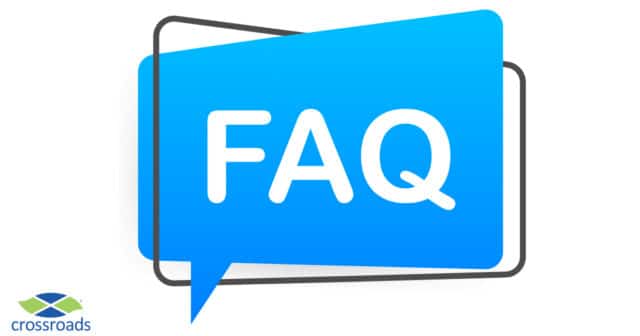
Frequently Asked Questions
Entering treatment is a big deal and with it comes a lot of questions. Here are the ones we hear most often.
How do opioids work?
Opioids attach to receptors in the brain. Once attached, they block pain, slow breathing, and produce a calming, anti-depressing effect. This video helps explain how it all works:
https://www.youtube.com/embed/AqDo4LiKz-c?feature=oembed
How does methadone work?
Methadone binds to the opiate receptors in the brain, which helps to eliminate opiate withdrawal symptoms, relieve withdrawal sickness, and block the effects of illicit opiate use.
How is methadone different from other opiates/opioids like Heroin, Oxycodone, Hydrocodone, Morphine, OxyContin, Percocet, Lortab, Roxicodone, Fentanyl or others?
Most prescription opiates that are abused and heroin have a characteristic of being fast acting. They tend to get the user very high very quickly for a short period of time before crashing. Methadone is a stabilizing medication. It is not fast acting and does not have the associated euphoric ‘high’ or devastating crash.
When correctly prescribed in a medication-based recovery support setting, patients will gradually reach a dose of medication that will calm the opiate receptors in their brain without making them feel high and protecting them from the cravings and withdrawal symptoms. Over time, this allows the brain to heal and patients to begin tapering off the medication while under the supervision of a doctor.
Is methadone safe? Are there any side effects?
Methadone is safe when taken as prescribed. It has been in use as a primary addiction treatment for over 40 years. As with most medications, some people may experience side effects like anxiety, insomnia, dry mouth, constipation, nausea or weakness. Most of the time these will subside as the body adjusts to the medication.
I’ve heard terrible things about methadone.
The stigma surrounding addiction has set the stage for the negative coverage of Methadone. And because Methadone is a schedule II narcotic, it’s often tossed in the same category with other abused and illicit narcotics. This is nothing short of tragic.
Over 40 years of research Methadone has been proven to be a powerfully effective method for treating opiate addiction. We’ve seen first hand: the change in people utilizing Methadone is remarkable. They go from…
- Chronically unemployed TO holding down a steady job
- Alienating friends and family TO gaining custody and repairing relationships
- Spending every penny on drugs TO paying bills on time and saving money
- Homeless TO owning their own home or paying their own rent on time
- Living for drugs TO enjoying a freer, healthier, happier quality of life
According to The Surgeon General’s Report on Alcohol, Drugs, and Health: “The combination of behavioral interventions and medications to treat substance use disorders is commonly referred to as MAT.
MAT is a highly effective treatment option for individuals with alcohol and opioid use disorders. Studies have repeatedly demonstrated the efficacy of MAT at reducing illicit drug use and overdose deaths improving retention in treatment and reducing HIV transmission.”
Methadone, when administered properly, is a lifesaver. But medication alone isn’t enough. It’s imperative to include behavior modification through counseling for success in recovery. That’s why we offer a 3-pronged approach:
1. Medication
With the cravings and withdrawal ceased, a person can gain footing in life. They can think, reason, make positive choices, and function normally.
2. Counseling
With the help of a trained counselor, a person in treatment can work through issues that lead to drug seeking behavior in the first place. They can find new ways to cope with stress and manage the challenges of life without the drugs.
3. Drug-screening
With this safety measure in place, people in treatment (especially early in treatment before behavior modification has taken root) will be monitored to be certain the medication is being taken appropriately.
Will Methadone cure my addiction?
There is no cure for addiction. However, people can recover and go on to lead normal, productive, healthy lives.
Is it possible to overdose on Methadone?
Yes. Methadone is a schedule II narcotic and can be dangerous. This is why we take our commitment to our patients’ health and safety very seriously. Crossroads takes special precautions specifically to reduce these risks:
- We monitor our new patients daily
- Adjust their doses meticulously
- Assess all of our patients constantly
- Limit the amount of take-home doses that patients can have
- Make every effort to educate our patients on medication safety
Each center provides for trained medical and clinical staff who are qualified to provide specific interventions if needed.
Does Methadone damage the body, get into the bones, or ruin your teeth?
These are common myths about Methadone. Dry mouth is a side effect for some people, which can lead to poor oral hygiene. Another common side effect is achy joints. But the ache is not from damage. Studies have proven that Methadone does not damage the body, weaken bones, or erode teeth.
How long will I be in treatment?
Every person is different. The length of time in treatment depends on many factors:
- How long the person has been using
- What drugs they were taking
- Willingness to fully engage in the program
- Strength of support system
- Level of physical wellness
Many other things contribute to how long it might take to be well again.
It’s safe to say that most people with Crossroads Treatment Centers are patients with us for at least one year.
Is Methadone safe for pregnant women?
Yes, Methadone Treatment is the preferred treatment for opioid dependent women who are pregnant as there is little risk to mother or infant. The use of Methadone is far safer than the use of any illicit drugs and the drug seeking behaviors that accompany addiction.
What if I miss a Methadone dose?
The most powerful words you will read on this page are these: Make your recovery your top priority.
It is important that you take your medication at the same time every day. If you unexpectedly are going to be unable to get your dose, you should contact your counselor so she/he can check in with you and set up options for guest dosing if needed. This form of treatment is based on daily doses of treatment medication therefore consistent absences over an extended period of time can lead to discharge from the program.
What if I need to travel out of town?

There are options for Methadone patients who travel:
Guest Dosing
Travel is a part of life. Therefore, guest dosing is common and frequent nationwide. Our center can set up guest dosing for you when you travel. It’s typical for a guest clinic to charge a fee, which will vary from facility-to-facility. You can find out about the fee at the time arrangements are made.
Take Homes
Take home medication privileges can be granted in circumstances of travel and are assessed on a patient-by-patient basis by the attending physician.
Exception Request
A Medication Exception Request applies in emergency situations, (out of town funeral, catastrophic event, etc). The granting of Medication Exception Request requires your counselor to submit a special request to both state and federal authorities for approval.
What will we talk about in counseling sessions?
There’s a lot to talk about during your treatment at Crossroads Treatment Centers. Like you, we wish for your complete recovery so you can move on to the things in life that bring you balance, health, and happiness. To get there, we start with a Psychosocial Assessment. Going forward we will begin by discussing the following topics:
- The Biology of Addiction & Recovery
- Orientation to Medication-Based Recovery Support
- Early Recovery
- Triggers, Thoughts, Cravings, Use
- External Triggers
- Internal Triggers
- Your Body Chemistry in Addiction
- Common Challenges in Early Recovery
As you progress, you and your counselor will talk specifically about how you can better manage things like:
- Addictive Behavior
- Relapse Prevention & Stabilization
- Boredom
- Avoiding Relapse Drift
- Work & Recovery
- Guilt & Shame
- Staying Busy
- Motivation for Recovery
- Total Abstinence
- Relapse Prevention
- Be Smart, Not Strong
- Managing Life, Managing Money
- Relapse Justification
- Dangerous Emotions
- Recognizing Stress
- Acceptance
- Spirituality
- Living a Less Stressful Life
- Taking Care of Yourself – Emotional Triggers
- Repairing Relationships
- Making New Friends
- One Day at a Time
- Holidays & Recovery
- Recreational Activities
If you choose, you can also participate in the optional Family/Conjoint Sessions where you will cover topics like:
- The Helping Checklists | Beginning Stage Helping Checklist
- Drugs, Alcohol & Sex
- Recovery Checklist
- Drug & Alcohol Dreams During Recovery
- Patient Status Review
- The Wall Checklist
- Emotions & Recover
Is treatment confidential?
Absolutely. Participation in this program and treatment records maintained by this program are protected by Federal law and regulations. We are not permitted to say to a person outside the program that you attend this program or disclose any information identifying you as someone receiving addiction treatment services, unless:
1. You consent in writing
2. The disclosure is allowed by a court order
3. The disclosure is made to medical personnel in a medical emergency or to qualified personnel assisting with your treatment services
4. An audit or evaluation is conducted by government agencies that fund or regulate a program
You should know: Federal law and regulations do not protect any information about a crime committed by a patient either at the program or against any person who works for the program or about any threat to commit such a crime. Federal laws and regulations also do not protect any information about suspected child abuse or neglect from being reported under State law to appropriate state or local authorities.
How do I begin treatment?
Contact us! There are lots of ways to do that.
Visit the Locations page here on our website, find the center nearest you and call the number.
Call our toll free number (800) 805-6989
Fill out the form on our Contact Us page
Message us on Facebook. All of our centers have a Facebook page where you can send a message. To find the page for the center nearest you, visit our Locations Page right here on the website. Each location page has a Facebook icon. Click that to be redirected to Facebook.
